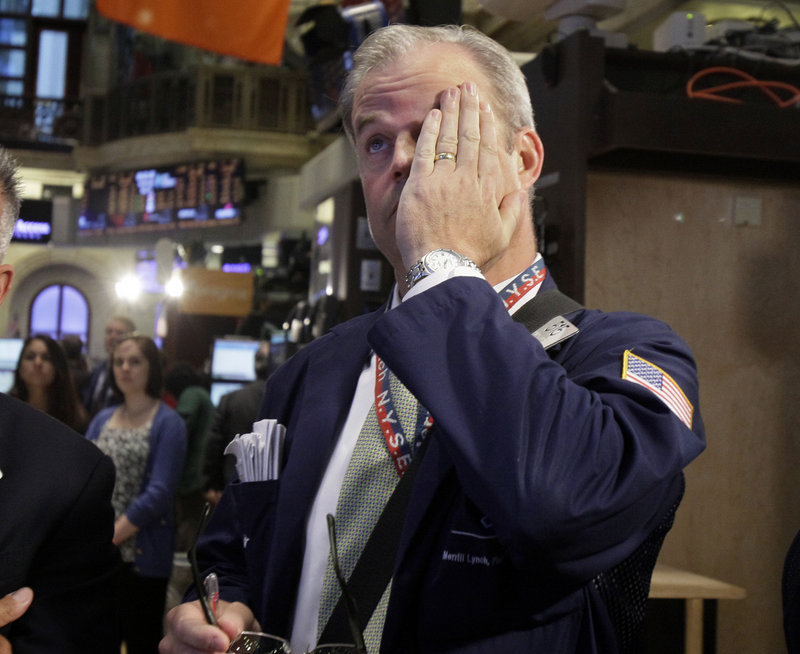Fearing a financial rupture in Europe, investors around the world fled from risk Wednesday. They punished stocks and the euro, and the yield on a benchmark U.S. bond hit its lowest point since World War II.
In the United States, where concerns about Europe have already wiped out most of this year’s gains for stocks, major averages fell more than 1 percent. The Dow Jones industrial average closed down 161 points.
With Spain’s banking system teetering and Greece’s political future unclear ahead of crucial elections next month, European stocks lost even more. The euro dropped below $1.24, to its lowest point since the summer of 2010.
“Everyone’s just afraid that if Europe doesn’t get its act together, there will be a big spillover in the U.S.,” said Peter Tchir, manager of the hedge fund TF Market Advisors.
He said the uncertainty over Europe’s future was reminiscent of the financial crisis in the fall of 2008, when it was briefly unclear whether banks would be bailed out and “we had these giant swings up and down.”
Wall Street, which woke up to increased anxiety over higher Spanish borrowing rates, was down from the opening bell.
The Dow closed down 160.83 points, or 1.3 percent, at 12,419.86. The Dow has had a miserable May, losing more than 6 percent, and is on track for its first losing month since September.
The Standard & Poor’s 500 index lost 19.10 points to 1,313.32. The Nasdaq composite index fell 33.63 to 2,837.36. Energy stocks were hit hardest because of a big drop in the price of oil, but stocks in all major industries fell.
The trigger for Wednesday’s sell-off was Spain, where the banking system is under strain a week after its fourth-largest bank required $23.8 billion in government aid to cover souring real estate loans.
Investors are increasingly worried that problems at the bank, Bankia, might recur at other Spanish banks. Many lent heavily during the nation’s real estate bubble. Losses from the real estate crash might be too big for Spain’s government to shoulder.
On Wednesday, borrowing rates rose sharply for Spain and Italy, which are seen as the next problem cases in a debt crisis that has rocked global markets for more than two years. Traders dumped bonds issued by those governments.
Intense demand for low-risk, easily tradable securities led investors to buy U.S. government debt. The yield on the 10-year Treasury note plunged to 1.61 percent from 1.74 percent late Tuesday.
Among U.S. stocks making moves:
• Monsanto, the agricultural company, was one of the few big gainers in a sea of red. It jumped 2.2 percent after its CEO said this year’s earnings will likely surge 25 percent, far more than Wall Street had been expecting. Sales were strong in its seed and chemicals business, including Roundup herbicides.
• Research in Motion, maker of the BlackBerry, plunged 7.1 percent after the company said late Tuesday that it had hired a team of bankers to help it weigh its options – Wall Street jargon for a possible sale or reorganization. RIM’s business has been crumbling as smartphone users move to iPhone and Android devices.
Send questions/comments to the editors.



Success. Please wait for the page to reload. If the page does not reload within 5 seconds, please refresh the page.
Enter your email and password to access comments.
Hi, to comment on stories you must . This profile is in addition to your subscription and website login.
Already have a commenting profile? .
Invalid username/password.
Please check your email to confirm and complete your registration.
Only subscribers are eligible to post comments. Please subscribe or login first for digital access. Here’s why.
Use the form below to reset your password. When you've submitted your account email, we will send an email with a reset code.